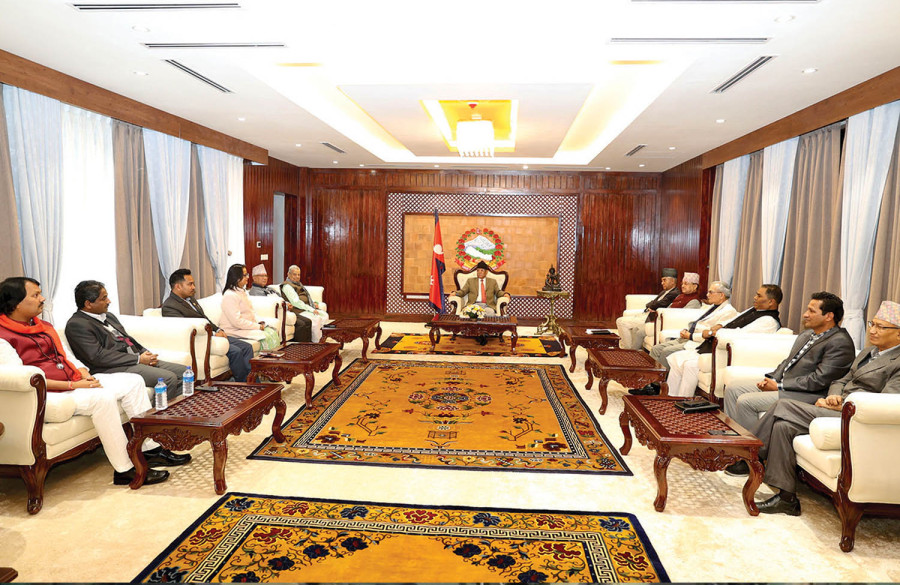National
Governance hit as parties busy themselves with power-sharing
Ten-party coalition mulls leading both federal and provincial governments by turns.
Tika R Pradhan
With Prime Minister Pushpa Kamal Dahal securing the parliament’s confidence on Monday, for a second time in 70 days, a political course has been completed. Since all major constitutional positions have already been filled, now the government is expected to expedite its functioning in a full swing by expanding the Cabinet.
On Tuesday morning, the prime minister met some of his coalition partners and discussed power-sharing.
“The prime minister held a meeting with leaders including Madhav Nepal and Purna Bahadur Khadka this morning and discussed ministerial appointments, among other things,” said Haribol Gajurel, chief adviser to the prime minister. “Since the parties have agreed to lead the federal government on a rotational basis, they are discussing applying the same approach to provincial governments also.”
There are, however, concerns that the plan to rule provinces by turns will bring regional instability.
Although the prime minister and coalition leaders claim that their partnership is for safeguarding the constitution and leading the country towards prosperity, the ongoing hard bargaining among parties for powerful portfolios and positions both at the centre and in provinces suggests otherwise.
The Nepali Congress, which has been offered eight ministerial portfolios in the Dahal Cabinet, has been struggling to pick ministerial nominees from among dozens of aspirants. The CPN (Unified Socialist) on Tuesday formed a task force led by its party chair Madhav Nepal to negotiate power-sharing at both the federal and provincial governments.
The taskforce will provide inputs for the common minimum programme and the upcoming by-elections, read a release from Unified Socialist General Secretary Ghanashyam Bhusal. The team includes party vice-chair Pramesh Hamal and Bhusal as members.
Following the party’s meeting, Unified Socialist leader Jhala Nath Khanal, a former prime minister, said the panel will also work on the nitty gritty of power-sharing.
On Tuesday, Prime Minister Dahal visited his electoral constituency in Gorkha where he said talks on Cabinet expansion have already begun and the coalition partners would helm both the federal and provincial governments by turns for the next five years.
“I’m planning a broader meeting to harmonise the businesses of the federal, provincial and local governments so that we will be able to address peoples’ developmental aspirations in a coordinated manner. We will hold serious discussions to put the country on the path of development.”
According to members of the prime minister’s secretariat, Dahal has already asked the parties in the coalition to pick their nominees for the Cabinet on the basis of their strength in Parliament.
Since the largest party Congress and the fourth-largest Rastriya Swatantra Party will benefit the most from power-sharing arrangement (second largest UML is in the opposition and third largest Maoists lead the government), the smaller parties are said to be unhappy with Dahal’s proposal.
All coalition partners are eyeing powerful ministries like Home and Finance–which were earlier led by the RSP and the UML, respectively.
The RSP is undecided on joining the government because its chair Rabi Lamichhane will be contesting the Chitwan-2 by-election scheduled for April 23.
The Congress is expected to get some eight ministries; the Maoist Centre may continue with its existing team; the RSP will get two to three ministries; the Janata Samajbadi Party and the Unified Socialist will get two each; and the Janamat Party, the Nagarik Unmukti Party and the Loktantrik Samajbadi Party are likely to be allocated one ministry each. The prime minister also wants to spare one ministry for either Prabhu Sah, the chair of Aam Janata Party, or independent lawmaker Amaresh Kumar Singh.
Provincial governments will also see a change in leadership.
A Maoist provincial assembly member in Madhesh said the prime minister has told the provincial leaders that the new coalition will make a package deal on power-sharing for both federal and provincial administrations.
“Janamat Party chair CK Raut has already told the coalition partners that his party should be allowed to head the Madhesh provincial government since the JSP got the vice-presidency,” said the Maoist leader and provincial assembly member. “I think there will be a package deal on power-sharing and this could affect the Madhesh and Sudurpaschim provinces too.”
With the government preoccupied with various elections, the country has been without a strong government for more than six months.
Prime Minister Dahal spent more than two months of his tenure fixing the coalition, leaving the Cabinet incomplete. Service delivery has been affected as most ministries are without ministers.




 18.12°C Kathmandu
18.12°C Kathmandu














